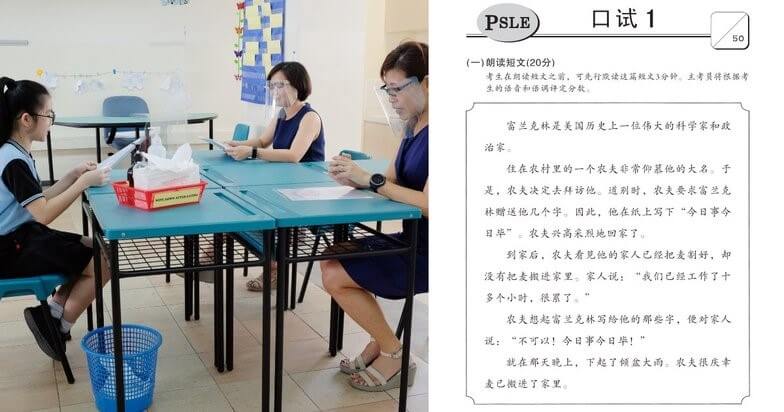
07 Oct Valuable tips to ace PSLE Chinese Oral Component
The Chinese PSLE Oral Exam makes up 25% of your entire Chinese subject. There are two parts to it, the reading aloud section takes up 20 marks, and the video conversation section takes up 30 marks. Students would be given a passage and a video with 10 minutes to prepare for both components.
After entering the examination room, students will reread the passage and watch the video.
You will be asked three questions that are related to the video you saw:
- A question related to what you have seen in the video
- A question that requires you to express your opinions on a topic related to the theme in the video
- A question that requires you to share an experience that extends beyond the theme of the video
Depending on how thorough your answers are, you may be asked one or two more guiding questions during the exam. The oral is meant to be interactive, so don’t take this as an indicator that you are losing marks. Enjoying the conversation should give you a better grade. In this article, we would like to share some valuable tips to help you prepare for the oral exam.

1) Be Loud and Clear
While it is essential to pronounce each word clearly, reading in clusters of words instead of one word at a time helps to show the examiner that you have the pronunciation aspect down pat. It also demonstrates your clear articulation of words.
Think of it as you are conversing with your favourite Chinese stall auntie. Do not be afraid to speak louder than usual because this shows the examiner that you are confident in what you are saying. Even if there are some words that you are unsure of, speak clearly and maintain a steady pace throughout the reading process. Remember to apply the right tone and pitch to convey emotions. The key here is to avoid sounding too monotonous.

2) Learn easy-to-remember phrases and idioms
The best way to demonstrate your vocabulary is to look up phrases and idioms that can be used on many topics. A quick google search would show you the most versatile Chinese phrases and idioms frequently used in compos and essays and can also be used in conversations.
When used correctly, these phrases impress examiners and can quickly help you gain a few more marks.
3) Be expressive and opinionated
Express yourself clearly and precisely. Examiners want to hear your opinions and have a conversation with you. Remember to maintain eye contact with the examiner while speaking, as students tend to converse with the paper. There is nothing short of torture for a teacher to have to listen to a barely audible student.
You can always ask your parents to help you prepare for oral examinations by asking you random questions about your day. Remember to answer them in Chinese and see how your parents react to you. If they ask you more questions, it can be a good sign because they want to find out more. The best way to impress the examiner in an oral exam is to answer effectively. This does not mean that you have to drone on and on while answering a question, but it means that you should answer the question with a direct answer.
Think of it like your essay has a word limit of 500 words. Although you will not get penalised for exceeding the limit, another student who can tell a story as enjoyable as yours in lesser time would be considered more effective and awarded more marks.
4) Practice every day
If you catch yourself sounding like a robot or taking deep breaths sometimes, you may be reading too fast and too much. Remember to take a break and pause at the right places while reading the passage or speaking. Punctuation marks are signs that help you determine whether to pause for a while before speaking again.
In this case, practice does make perfect. Applying the right type of pauses helps to breathe life into the passage. It shows the examiner that you not only understand the context of the passage but can fully comprehend the values and emotions the story evokes.

5) Focus
While preparing for the exam, immediately scan the passage for the theme of the video. Remember critical details to have a smooth and pleasant conversation with the teachers. Some examples are the location, setting and characters.
Events in the video should give you an idea of what questions the examiner may ask. Taking note of the character’s actions in the video would help you form your opinion before the examiner starts asking questions.
Forming your thoughts beforehand allows you to be fully prepared and reduces the need to think on the spot when faced with questions. The worst thing that can happen to you is panicking and not saying anything or blurting out whatever comes from your head when questioned. Being able to articulate your thoughts well when asked shows the examiner that you know how to prepare well for the exam and speak your thoughts eloquently and confidently.
6) Exposure to different mediums
Don’t be afraid to read Chinese newspapers or watch Chinese TV shows more often in the days leading to your oral exam. It helps you acclimatise to a Chinese-speaking environment passively if you do not speak Chinese at home often. This helps with any unfamiliarity you may have with the language.
Being comfortable speaking Chinese helps with your marks as examiners can pick up on your non-verbal cues to tell if you have been practising beforehand.
How can your parents help?
There are common examination topics, these are:
- Sports/Events
- Elderly
- Bullying
- Performances/Concerts
- Food
- Healthcare
- Transport
Research on Google or ask your parents to help you with any Chinese terms you don’t know about these themes. Prepare vocabulary and ideas for these themes, and you should ace the oral examination easily.


